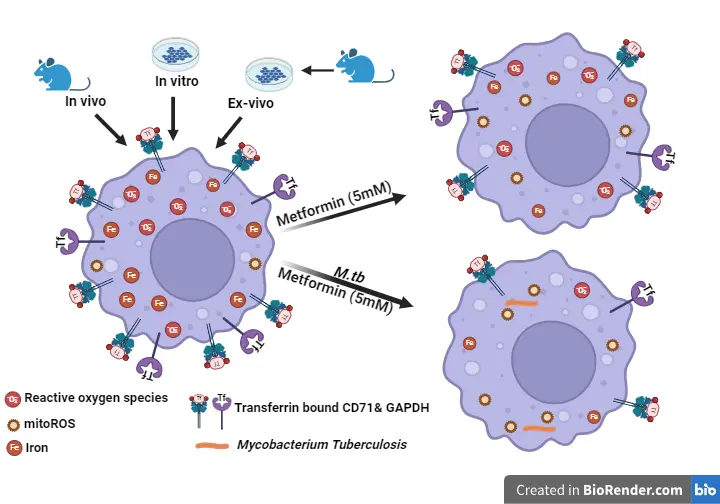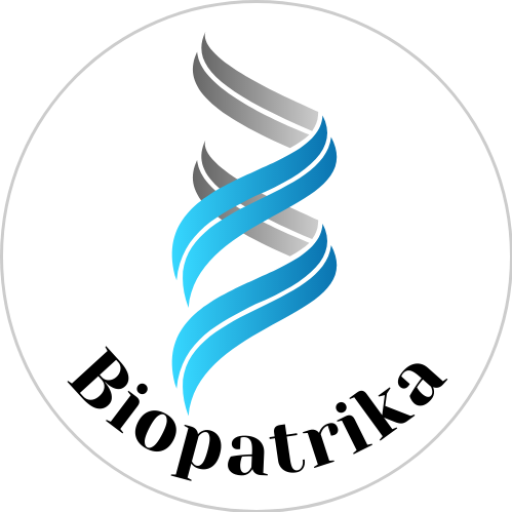Research Summary: Metformin limits iron availability and boosts mitochondrial ROS in host macrophages, creating a hostile environment for intracellular Mycobacterium tuberculosis.
Author intervie

Dr. Radheshyam and Dr. Gaurav Kumar Chaubey completed their Ph.D. degrees under the guidance of Dr. Manoj Raje at the CSIR-Institute of Microbial Technology, Chandigarh. During their doctoral studies, Dr. Radheshyam investigated the interplay between iron homeostasis and pathogens, while Dr. Gaurav Kumar Chaubey focused on the role of iron in diabetic-TB co-morbidity. Currently, both are pursuing postdoctoral research—Dr. Radheshyam at Albert Einstein College of Medicine in New York, USA, and Dr. Gaurav Kumar Chaubey at Washington University in St. Louis, USA.
Lab: Dr. Manoj Raje, CSIR- Institute of Microbial Technology, Chandigarh
What was the core problem you aimed to solve with this research?
Metformin, a widely used antidiabetic medication, has shown potential as an adjunct host-directed therapy for tuberculosis; however, its antimycobacterial mechanisms remain incompletely understood. Mycobacterium tuberculosis (M.tb), a highly virulent intracellular pathogen, relies heavily on host-derived iron for its survival and replication. To support its persistence, M.tb actively manipulates host iron acquisition pathways. Iron is particularly critical for the pathogen’s lifecycle, especially in facilitating its shift from a dormant, latent state to active disease.

How did you go about solving this problem?
Our findings demonstrate that metformin lowers intracellular iron levels by inhibiting the endocytic uptake of transferrin, the primary iron transport protein. Using in vitro and ex vivo macrophage models, along with an in vivo rodent system, we observed reduced surface recruitment of both classical (CD71) and non-classical (GAPDH) transferrin receptors. These results suggest that metformin may offer host-directed therapeutic advantages by modulating iron homeostasis in a coordinated manner.
How would you explain your research outcomes (Key findings) to the non-scientific community?
Metformin, a widely used anti-diabetic drug, also enhances the body’s defense against tuberculosis by making immune cells less hospitable to TB bacteria. During infection, it combats bacterial growth through multiple mechanisms. In our study, we identified two distinct pathways: (1) Metformin lowers intracellular iron levels, depriving TB bacteria of a critical resource needed for survival and replication; and (2) it boosts mitochondrial reactive oxygen species, which can damage or kill the bacteria. Together, these effects create a hostile intracellular environment, reducing the survival of TB pathogens.
Our lab primarily focuses on iron trafficking in mammalian cells. Based on our recent findings, metformin appears to be a promising treatment choice for individuals with diabetes living in TB-endemic regions. Moreover, it shows potential as an effective adjunct therapy for tuberculosis patients more broadly. – Dr. Manoj Raje
What are the potential implications of your findings for the field and society?
Antituberculosis (anti-TB) drugs are effective in treating Mycobacterium tuberculosis infections, but their use comes with several challenges and limitations. Standard TB treatment requires a 6-month regimen with multiple drugs (e.g., isoniazid, rifampicin, ethambutol, pyrazinamide). This prolonged treatment leads to poor adherence, increasing the risk of relapse and resistance. Anti-TB drugs are essential for disease control, their effectiveness is hindered by long regimens, toxicity, resistance, and logistical challenges. It is highlighting the need for new drugs and better host-directed therapies like Metformin. Metformin is scientifically sound and clinically promising, particularly as a host-directed adjunct therapy. This approach offers a low-cost and scalable solution, especially beneficial in regions with high TB-diabetes co-infection rates. By focusing on the host instead of the pathogen, such strategies have the potential to substantially lower the global TB burden and contribute to controlling the growing threat of antibiotic resistance.
What was the exciting moment during your research?
First, we observed something intriguing in vitro—metformin significantly reduced transferrin uptake. That alone caught our attention. But then came the flow cytometry data from mouse macrophages, and—same result! Transferrin uptake dropped sharply. The lab’s reaction was straight out of a sci-fi scene: someone shouted, “It’s stealing the iron!”, another froze mid-experiment, and our flow cytometer suddenly felt like the hero of the story for exposing M. tuberculosis. In that moment, metformin wasn’t just an anti-diabetic drug—it was the mastermind behind an iron heist.
Paper reference: Modanwal R*, Chaubey GK*, Dilawari R, Talukdar S, Sindhu A, Raje CI, Raje M. Metformin induces iron deprivation and enhances mitochondrial ROS in macrophages creating a hostile environment for survival of intracellular Mycobacterium tuberculosis. Biomed Pharmacother. 2025 Aug;189:118314. https://doi.org/10.1016/j.biopha.2025.118314 (* Co-First Author)
Explore more
🎤 Career – Real career stories and job profiles of life science professionals. Discover current opportunities for students and researchers.
💼 Jobs – The latest job openings and internship alerts across academia and industry.
📢 Advertise with BioPatrika – Reach the Right Audience, Fast!
🛠️ Services – Regulatory support, patent filing assistance, and career consulting services.




